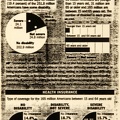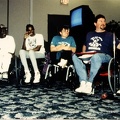Boston Sunday Globe
Sunday May 1, 1994
Globe Photo by Dennis Vandal:
A woman sits in her reclining wheelchair in front of a raise up computer. On her lapboard in front of her she has one hand on a device of some kind. Above that on a raised platform in front of the computer is a keyboard. She appears to have very limited mobility. What look like degrees or awards hang on the walls beside her computer and behind her. The room is dark.
Caption reads: Veronica McSherry, working at her computer in her Worchester home, says without a personal care attendant, "I couldn't function at all."
[Headline] Disabled are wary on health reform
[subheading] Washington rally set to air concerns
By Richard A. Knox, Globe Staff
Advocates for Americans with disabilities, a group that by one official count makes up one-fifth of the US population, say disabled people constitute a litmus test for health care reform. “If the system works for us, it will work for anybody," says Linda Long, a Massachusetts disability lawyer.
But the way health care reform addresses the needs of the disabled is a test many anxious activists fear Congress will fail. Some believe reform may even leave people with disabilities worse off than they are now. “ln a very real sense, people with disabilities have the most to gain and the most to lose with health care reform," says Frederick A. Fay, a Massachusetts psychologist who has been paralyzed from the neck down since a backyard accident 30 years ago.
“I'm a little discouraged," adds Edward V. Roberts. a Californian who founded the ‘independent living" movement in the 1970s and now heads the World Institute on Disabilities. Like 1,000 or more other advocates for disabled people, Roberts plans to roll his wheelchair across Washington's Memorial Bridge tomorrow to a rally at the Lincoln Memorial. “Somehow we've got to wake Americans up to the fact that this issue is not just about money."
People with disabilities are not just “a little special interest group." insists Washington activist Justin Dart Jr., 64, the Republican scion of a wealthy Houston family and a wheelchair-using polio survivor. Disability touches “every family in America, including the families of the health care lobbyists who oppose significant reform, Dart says.
The number of Americans with disabilities is large by any reckoning. The Census Bureau's definition encompasses 49 million people, about half of whom are considered severely disabled. Mitchell LaPlante, who heads the Disability Statistics Program at the University of California at San Francisco, says 36 million Americans have impairments that significantly limit their activities, about 25 mfllion of whom are under age 65.
But such static numbers can be misleading. The figures show that the vast majority of Americans will become disabled if they live long enough. Brandis University sociologist Irving Kenneth Zola, another polio survivor, notes that “from one third to one-half of one's later years will be spent dealing with a disability."
To underscore this point. some disability activists like to call the rest of us “temporarily able-bodied.”
“We embody the health care needs of the total population over time," says Bob Griss, director of the Washington-based Center on Disability and Health. “If the system doesn't meet our needs now, it isn’t going to meet the temporarily able-bodied population's later on.”
No one is so heartless (or politically foolhardy) as to assert publicly that this country cannot afford to care for people who use wheelchairs, require assistance to dress or bathe, or are dependent on respirators. Nevertheless, the reform debate's current rhetorical drift is propelled by an assumption that many proposals are too costly even for Americans with ordinary health care needs, not to mention those who need [words missing] intensive care.
[subheadline] Attack on universal coverage
Politicians express doubt, for example, that the nation can guarantee universal health insurance coverage. Lack of insurance is a special problem for people with disabilities, more than 4 million of whom lack any coverage despite government safety-net programs such as Medicare and Medicaid.
“A person with a disability who does not have health insurance utilizes 35 to 50 percent less physician and hospital care, compared to one with similar disabilities who is insured," says LaPlante.
Many worry about the strong incentives to join managed care health plans in many proposals, including President Clinton's. They point out that such plans’ emphasis on gate-keepers--primary care physicians who decide whether patients need more specialized care--may bar disabled subscribers from seeing specialists for their unique needs.
“Typically you have to make a lot of noise to get the care you need,” said Michael Auberger, 39, a leader of ADAPT (American Disabled for Attendant Programs Today) who was paralyzed in all four extremities by a bobsled accident. “If you aren't a real strong advocate, you just continue to deal with physicians who have no idea about disability.”
“Their concerns are probably correct," said Dr. Harris Berman,
president of Tufts-Associated Health Plan in Massachusetts. “I'd welcome legislation to ensure that disabled people are appropriately cared for. That's what government is for.”
Another motif in the debate is the assertion that health insurance
benefits, current and proposed, are too generous.
The American Academy of Actuaries last month criticized Clinton's
health plan benefit package as “richer than it should be,” while conservative members of Congress argue that liberal tax treatment of health insurance premiums has led to Americans being “over-insured.”
Such statements have an ominous ring to disability activists, most
of whom favor either a government sponsored “single-payer” health plan or Clinton's proposal, even though they criticize certain elements.
- Creado en
- Martes 16 Xullo 2013
- Enviado o
- Mércores 7 Agosto 2019
- Visitas
- 187
- Valoración
- non valorada
- Valora esta foto


0 comentario